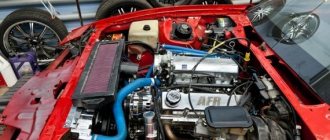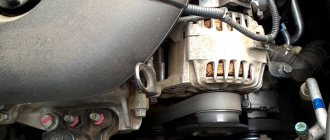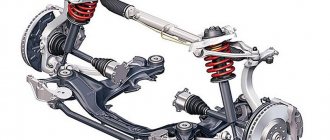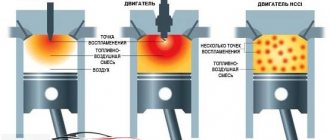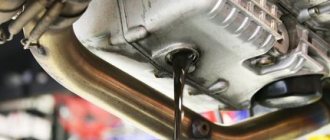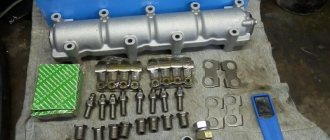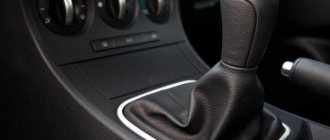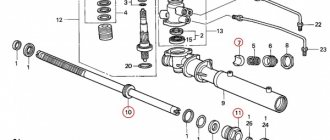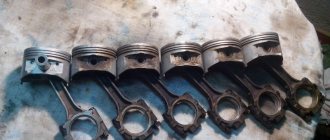A knocking sound when the engine is hot is almost always a symptom of a serious problem. When the engine is warm, not only hydraulic compensators, unadjusted valves or a timing chain can knock, but also connecting rods, main bearings, or a cracked piston pin, and even a piston that has cracks on its skirt. In any case, it is better to carry out diagnostics not in a garage, but by turning to a car service center for help, since most likely you will need to disassemble the engine.
| Engine operating mode | Causes of knocking |
| Knock at idle |
|
| Knocking noise when under load and increasing rpm |
|
How to independently determine engine knocking
Knocking in engines is a problem that can interfere with important work, including trucking. The PEGAS company organizes turnkey cargo transportation by road. Your goods and cargo will not only be delivered from point A to point B, but all logistics and time frames will also be thought through. In the markets of Europe, Russia, China, Uzbekistan, Tajikistan, Kazakhstan, the company’s specialists work door to door.
Of course, it won’t be possible to identify a malfunction without some experience, but if you follow a few simple tips, you can find out where the knock is coming from. This allows you to narrow down the range of possible breakdowns, and often even determine what exactly caused the problem. Remember a few simple tips:
- Always listen to the sound of the engine. This will allow you to identify the problem at an early stage, which often allows you to avoid large-scale breakdowns and simplify repair work. Pay attention to any deviations, as extraneous sounds do not appear just like that.
- Make sure that the noise comes from the power unit. To do this, depress the clutch and put the car in neutral to open the drive in the box. Then open the hood and listen to where the knocking noise is coming from.
- It is important to understand when problems arise - when hot, at idle or under load. It often happens that a cold engine knocks, but as it warms up, the extraneous sounds disappear.
- To pinpoint where the knocking noise is coming from, buy a car stethoscope. It is inexpensive and allows for very high-quality diagnostics. Assembling a homemade device from a metal rod and a can, as many advise, is much more difficult than buying a ready-made one. It will also be useful in the future, because with its help you can not only find the source of the knocking, but also diagnose a failed roller or bearing.
Important!
The louder the noise, the more dangerous it is. If you can get to your home or service station with minor noises, it is extremely undesirable to drive with a strong knock.
Why does the engine knock?
There can be many reasons for this, which is why it is important to determine the nature of the malfunction and the conditions under which it manifests itself:
- Lack or absence of oil in the lubrication system.
- Loss of properties by the lubricant, clogging of the channels in the block with the emulsion, which is why individual components run dry and begin to knock.
- Faulty hydraulic compensators. These elements ensure normal operation of the valves and when they fail they begin to make a lot of noise.
- Incorrect valve adjustment. This problem occurs in older models, where the valves need to be adjusted using a feeler gauge and there are no hydraulic compensators.
- Poor quality fuel.
- Wear of individual components, due to which the normal clearances are violated and the free play becomes too large, which provokes a knock.
For a more detailed study of the problem, below are descriptions of specific situations and features of knocking that occur under certain conditions.
In the cold
If it knocks when cold, the sounds are not very strong and after heating the knock disappears, there is no particular reason for concern. For many modern engines this is a kind of norm and can be observed even on relatively new cars with minimal mileage. Most often the following nodes are to blame:
- Hydraulic compensators. In many engines with a hydraulic timing chain tensioning system, oil pressure is not created immediately, which causes various knocking noises. In the same Prioras, the knocking of hydraulic compensators when cold is a common problem, which is often solved by replacing the oil with a higher quality one. If this does not help, it is worth checking the elements, paying special attention to the lubrication system. Often the small holes in the tube become clogged.
- When the liners wear out, the pistons move more freely than they should, which is why knocking occurs. As the parts heat up, the gap decreases naturally and the motor begins to operate normally.
- If the engine has aluminum pistons, they are initially installed with a large gap, since the metal expands noticeably as it heats up. In this case, knocking is normal. It usually disappears within a couple of minutes.
- The timing chain in some cars can rattle when cold, the sound comes from the front end. This is also not much of a problem if everything returns to normal after a couple of minutes.
By the way!
When the knocking noise disappears after warming up, do not start driving until the engine starts running normally.
Main reasons
Knocking in the engine is an unpleasant phenomenon, and many people associate it with large waste. If you take timely measures, you can get by with a minimum of money spent, since there are dozens of parts in the design of the motor, then almost every one of them can make noise. The main causes of knocking are:
- insufficient oil level in the crankcase;
- Constantly high loads on the internal combustion engine, which leads to accelerated wear and the appearance of gaps;
- regular overheating;
- using low quality oil.
All this can cause a breakdown of a particular unit, which will make a characteristic knocking noise and, accordingly, lead to a number of other consequences.
Hot
This situation is much more dangerous. Most often it signals serious problems. The nature of knocking as it heats up is due to the fact that cold oil is thick, so all the gaps are sealed. As it heats up, the consistency becomes thinner and knocking noises appear in all worn-out components. Usually the reasons are the following:
- Main bearing wear. The reason is the increased gap between the crankshaft journal and the main liner.
- Worn connecting rod bearings. A hot knock appears when there is slight wear on the connecting rod journal or support. If the degree of wear is large, it will make noise both on a heated and cold internal combustion engine.
- Cracks in piston pins also appear mainly when the unit is hot. This is a dangerous malfunction that can cause severe damage to the unit.
- A cracked piston skirt disrupts its geometry. As it heats up, the gap expands and knocking noises appear. Most often, one of the elements is damaged.
First of all, check the oil level. Sometimes after topping up the problem is solved and does not return. Another option is low-quality fuel; here we can recommend using a special additive to increase the octane number and adding high-quality gasoline. You should not refuel with questionable fuel, as it may cause the engine to fail.
Sound criteria
There are plenty of reasons why the engine knocks. Some knocking noises only indicate minor problems that can be easily diagnosed and corrected during the next inspection. But there are a number of sounds that very clearly indicate that there are serious problems with the internal combustion engine that require immediate intervention in order to avoid the occurrence of many unpleasant situations, such as, for example, a major engine overhaul.
The occurrence of any sound occurs due to the fact that one element of the internal combustion engine hits another, and each of the impacts can have its own individual sound coloring, intensity, duration and frequency.
Under load
It is worth noting that noise at idle speed is not very dangerous and is most often caused by a vibrating timing belt casing, pulleys or other elements touching the housing, or loose fastening of individual components. But when knocking occurs under load, everything is much more serious:
- When over-accelerating, sharp acceleration, or when the speed decreases, a very high-pitched and ringing sound may be heard, indicating wear on the piston pins. Also, a similar problem occurs when using low-quality gasoline, as well as when driving under load in a gear that is too high.
- If, when you press the gas pedal sharply, you hear a dull knock at the bottom of the cylinder block, most likely the problem is in the crankshaft bearings.
- When the connecting rod bearings are worn out, the sound is similar to the previous one, but its volume and intensity increases greatly as the speed increases. Driving with such a problem is extremely dangerous due to the risk of engine seizure.
Important!
If you do not pay attention to extraneous sound under load, most often it becomes stronger over time and appears much more often.
A number of other reasons
Other components that have not yet been described can also cause knocking. This list includes:
- Fuel pump drive. You will hear a loud knocking sound similar to the sound from the valves.
- Connecting rods knocking due to worn bearings. By turning off the cylinders one by one, you can diagnose the problem.
- Incorrect cylinder block gasket dimensions. It protrudes into the combustion chamber, where it is touched by the cylinder. Characterized by a dull sound.
- Plunger pairs. They can make noise in diesel units. Not critical.
The complexity of the motor design makes diagnosis and repair a complex process. The best option is a trip to a specialized technical center. As a rule, such workshops have all the necessary equipment that will help identify the cause of the knocking. If the car has an electronic control unit, you can additionally perform computer diagnostics.
How to get rid of engine knocking
The measures that will be required may vary greatly from case to case. The easiest way to figure out what to do first to fix the problem is:
- Changing the oil to a high-quality one with mandatory flushing of the system. Very often this simple action eliminates all problems, and if you subsequently change the lubricant on time, the knocking will not return for a very long time. Try to fill in oil recommended by the manufacturer, which has good reviews from car owners. To clean the system, use reliable options that will not damage the seals.
- Checking hydraulic compensators and replacing jammed ones. A problem that is easy to fix on your own. To reduce costs, you can not change all the elements, but only those that do not work. During the repair process, do not forget to flush the lubrication lines and clean the holes in the tube with a needle or suitable tool.
- If the knocking occurs due to improper valve adjustment, they should be adjusted. For this, special washers or a classic system with measuring the gap with a feeler gauge can be used.
- Often the problem is a stretched timing chain. Or the damper fails, and instead of stabilizing the operation of the chain, it rattles very loudly. Replacement can most often be done on your own according to the car manufacturer’s instructions.
- Worn rollers and bearings can also be the culprit of extraneous noise. The problem is solved by replacing the node.
- In case of malfunctions of the cylinder-piston group, it is better to entrust repair work to specialists. Most often it is necessary to disassemble the engine, remove defective parts and carry out major repairs.
By the way!
There are so-called problem motors for which knocking is the norm. As an example, we can cite 1.6 liter Volkswagen Polo engines and diesel cars from Renault, produced from 2001 to 2009. Knocking in them is a common occurrence.
Extraneous noise in the engine should not be ignored; it is important to understand the reasons for its occurrence in order to understand what measures need to be taken. This can be either a malfunction or normal for certain internal combustion engines. The nature of the repair and its complexity depends on where the knocking occurred and what part needs to be done.
